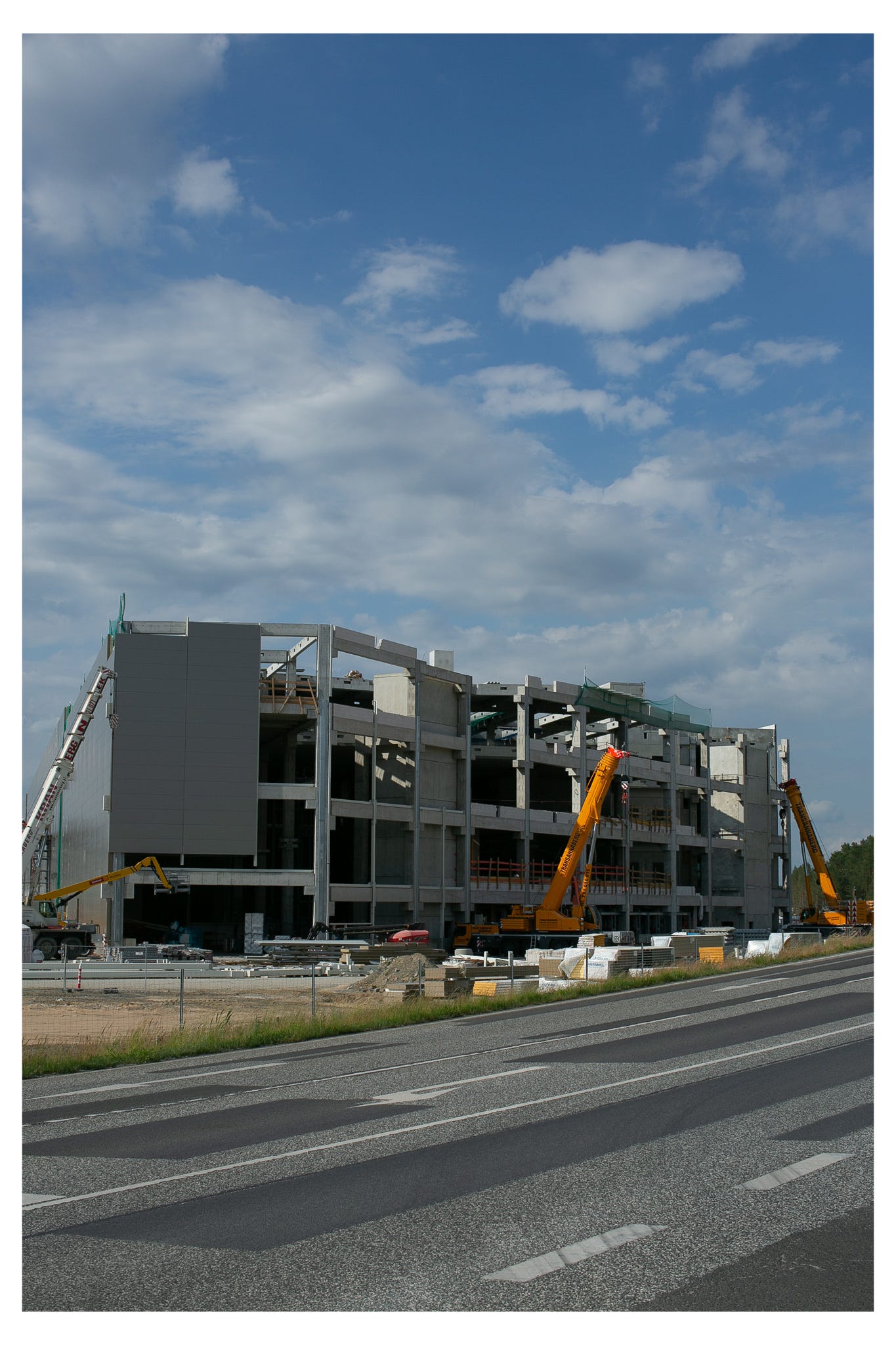Deutschland Update #11
Topics this week:
Tesla frightens Brandenburg
Trusteeship for Rosneft in Germany
Working hours must be tracked
Tesla sticking to plans to build EV batteries in Brandenburg
A report published on Thursday in the Wall Street Journal that speculated that Tesla might consider scuttling its plans to build a battery plant alongside its production facility in Brandenburg was the source of alarm in local media this past week.
The report cited company insiders who claimed that the electric car manufacturer would be prioritizing the construction of a similar battery plant in Texas on account of substantial new tax incentives that are soon to take effect. The recently passed Inflation Reduction Act provides tax credits that could offset up to a third of the total cost of electric vehicle (EV) battery packs, as long as those batteries are produced domestically in the U.S..
These types of production incentives do not currently exist in Europe, and the rumors of the company’s exit from its battery production plans in the region were cause for some hand-wringing regarding potential “unfairness” in the trans-Atlantic trade relationship. “The Inflation Reduction Act is leading to competitive disadvantages in Europe,” the Brandenburg Ministry of Economics told the Handelsblatt newspaper. “The EU needs to respond in terms of legislative aid, in order to produce on an equal playing field.”
However, it quickly became clear that Tesla would be holding to its plans to build out its battery production capacity in Germany as planned. RBB reported on Friday that, according to company insiders, construction of both plants, in Texas and in Brandenburg, would continue. The company said that some personnel from Germany would be brought to Texas to help accelerate the process there, but this shouldn’t affect the construction timeline in Germany.
Context:
Video: Elon Musk’s reaction to a question regarding local concerns over the extent of groundwater usage at Tesla’s factory in Brandenburg, August 2021.
Despite any unfair advantages brought by recently passed U.S. legislation, Brandenburg is well on its way to becoming a major center for EV production in Europe. Tesla’s surprise announcement in 2019 that Grünheide would be the location of its first “Giga Factory” in Europe was welcomed by state and federal authorities alike, which allowed the company to construct the factory at breathtaking speed by German standards.
A steady stream of large scale investments in the region around the supply chain of EV production has followed in its wake – BASF has set up a cathode factory and battery recycling facility, the Canadian mining company RockTech is building a lithium refinery in Guben, and the lithium itself will be mined in the state of Sachsen, just to the south, beginning in 2025. The growing advantages of the region in EV production is clear. This and the growing size of the EV market in Europe (see chart below) should reassure policy makers in the region that these investments are steadfast.
This instance of trans-Atlantic finger pointing around what seem like unfair advantages bestowed upon domestic manufacturers, is however something that we should get used to. As the global economy has weathered the crises of the past years, policy makers in some of the world’s largest economies have decided that developing and maintaining domestic production capacity in certain key industries will work to their advantage in the future. The supply chain for electric vehicles is one of those industries, and the tax incentives in the Inflation Reduction Act will inevitably encourage domestic investment. That is more important to policy makers in the U.S. than any inequity that might result amongst its trading partners.
U.S. Trade Representative Katherine Tai alluded to this change in perspective in an interview with the Handelsblatt newspaper this week. She indicated that the U.S. does not inted on restarting negotiations over the TTIP trade agreement, which were suspended under former president Donald Trump. Instead, she argued that the U.S. is taking a different approach to globalization, one that prioritizes not only efficiency, but also resilience. “The version of globalization that we are trying to develop does away with the idea that more trade is necessarily better for everyone,” she said.
**(If you are interested in a more thorough accounting of how Tesla’s investment in Brandeburg and the unprecedented speed at which it was completed, I wrote a long-form piece on the topic in July, which you can read here.)
Germany places Rosneft subsidiaries under trusteeship
The Federal Government announced in a press conference on Friday that it has placed the two German subsidiaries of the Russian oil company Rosneft under the trusteeship of the Federal Network Agency.
The two subsidiaries, Rosneft Deutschland GmbH and Rosneft Refining & Marketing GmbH together hold a 54% ownership in the PCK Oil Refinery complex located in Schwedt, north-east of Berlin on the Polish border. In the press conference, Chancellor Olaf Scholz said that the purpose of the trusteeship is to ensure that “Germany will be supplied with oil in the middle- and long-term” and in particular to ensure the continued operation of the refinery in Schwedt.
The refinery plays a crucial role in supplying eastern Germany and Poland with refined petroleum products and is supplied exclusively through the Druschba pipeline that carries crude from western Siberia and terminates in Schwedt. According to statistics made available by PCK, it processes 12 million tons of crude oil each year and supplies 90% of all the refined petroleum products (heating oil, kerosene, gasoline, diesel) consumed in Berlin and Brandenburg.
However, its ownership structure has made it a point of contention since the beginning of Russia’s war of aggression in Ukraine. The 27 EU member states agreed in May to institute a ban on Russian oil imports beginning in 2023, but the Russian majority owners had signaled little willingness to diversify its supplies away from Russian crude.
This vested interest in maintaining Russian crude supplies was one driving factory leading towards an eventual trusteeship. Another was Polish antipathy towards working with a Russian company. Alternative crude sources could potentially supply PCK via the port of Danzig, however Polish authorities have refused to enter into any undertaking that might benefit a Russian company. Finally, banks and insurers have been skeptical of doing business with the German subsidiaries of the Russian oil giant since the implementation of wide-ranging economic sanctions, even if the subsidiary isn’t explicitly subject to them. This “overcompliance” was driving real concern that the company would soon cease being able to operate without access to insurance and bank lending.
The implementation of the trusteeship would seem to address these issues, however questions remain as to how the refinery will be supplied to run at capacity without Russian oil deliveries. There is an existing pipeline that runs between the port of Rostock on the Baltic Sea coast to Schwedt, however it has never been used continuously (it was planned as an emergency back-up) and at its current capacity could only supply 48-68% of the capacity of the refinery. According to PCK, 60% capacity is the absolute lowest level at which the refinery can operate.
The Economics Ministry has announced plans to both expand the pipeline’s capacity, as well as that of the port of Rostock, but this phase will take up to three years. In the meantime, assuring that the refinery is running at least at minimum capacity will involve significant logistical gymnastics that will inevitably bring higher costs. So, if you drive a car and live in eastern Germany, expect to see some substantial price increases at the pump over the next years.
Labor court rules working hours must be tracked
The Federal Labor Court in Erfurt ruled last week that employers are indeed required to implement a system to record the working hours of their employees. The decision came in a case involving an assisted living facility in Nordrhein-Westfalen. Workers wished to implement a system for tracking working hours, management was against it. The court pointed to a ruling of the European Court of Justice (ECoJ) from 2019, which said that all member states are obligated to enact laws requiring the systematic recording of employees working hours.
The arguments of the parties involved were thus moot – it is already the law of the land that employers must have a system for keeping track of their employees’ working hours. Since that ruling in 2019, the German government has taken no action to implement the legislative changes it mandates. By basing its decision on the ECoJ decision, the Federal Labor Court is sending a very loud reminder to the executive and legislative branches of government that the decisions of the highest European courts do indeed apply in Germany.
Federal Minister of Labor Hubertus Heil, whose Ministry is responsible for drafting legislation that deals with labor issues, said that they will wait until the Federal Labor Court releases the full text of its decision before drafting and introducing legislation that would implement the new rules with more nuance. It is no longer a question if working hours must be tracked, but how it can be done within the bounds of the law.
Context:
The tracking of working hours in Germany has, in modern times, been limited to sectors where informal employment is more common. It has always been a standard practice in gastronomy and construction. In other sectors, where workers are often employed under fixed contracts, it has become less common. The practice of “Vertrauensarbeitszeit” (trusted working hours) has been relied upon, whereby employers and employees operate under the assumption that the contractually agreed upon number of working hours are being fulfilled.
This type of arrangement has also become more widespread in the German labor market in the context of the Corona pandemic, as the number of workers who fulfill at least part of their working obligations from home has increased significantly. It is a flexible arrangement that many see as an advantage, however it cuts both ways. The ECoJ decision in 2019 sought to protect workers from uncompensated over-hours, a situation that can easily arise when the boundaries between working and not working become blurred in a work-from-home context.
Currently the decision of the Federal Labor Court brings with it more questions than answers. Will workers be required to keep track of their hours, or must they simply be given the option to do so? What is an acceptable system – will a spreadsheet suffice? Will “Vertrauensarbeitszeit” be possible in sectors where both employees and employers see it as the optimal solution? None of these will be answered until the Labor Ministry presents its draft legislation. In the meantime, it’s probably best to open a new sheet and start tracking your working hours, given that it is indeed the law of the land.






